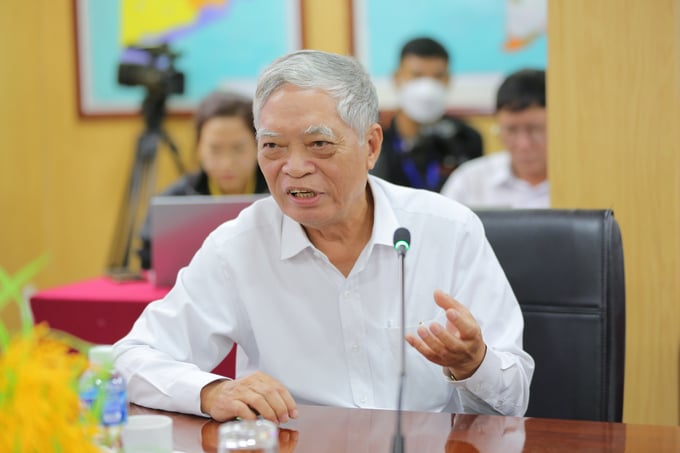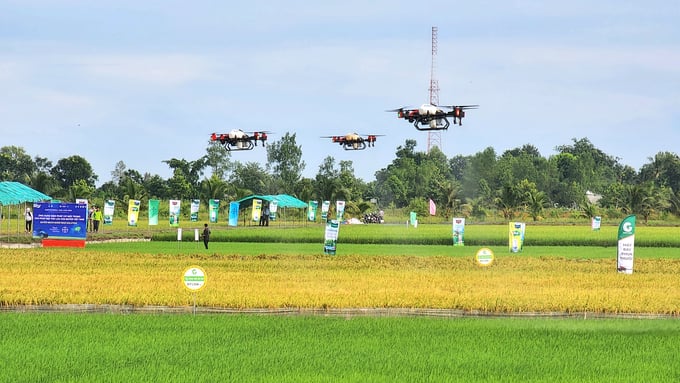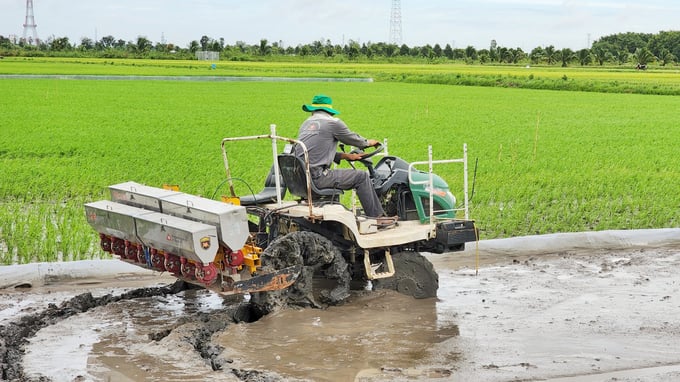May 28, 2025 | 11:56 GMT +7
May 28, 2025 | 11:56 GMT +7
Hotline: 0913.378.918
May 28, 2025 | 11:56 GMT +7
Hotline: 0913.378.918

Dr. Bui Ba Bong, former Deputy Minister of Agriculture and Rural Development, commented on the development of mechanized rice production. Photo: Kim Anh.
Regarding the story of mechanization in agriculture, Dr. Bui Ba Bong, former Deputy Minister of Agriculture and Rural Development, said that it was essential to consider what aspect is the weakest in mechanization to make an impact on it. On the other hand, the agriculture sector needs to complete synchronous mechanization in the value chain with a broader view, visualizing “what tomorrow will be”. Mechanization must integrate digital technology and aim toward precision agriculture.
The image of “plow and buffalo” has basically been replaced by a combine harvester. “Harvesters and threshers were insignificantly few in 2005, but after the BPH epidemic, the collection of crops created pressure on farmers in terms of harvesting. Since then, combine harvesters have become the best choice. Transplanters have also marked its ‘footprints’ in farmer’s fields," said Dr. Bui Ba Bong.
Dr. Bui Ba Bong pointed out that the current limitation in the field of cultivation was the low rate of mechanization in the sowing stage. Looking back a few years ago, the usage of transplanters was considered very good, but the implementation cost was high and showed certain difficulties in the seeding and substrate-making stage. Cluster seeding by machine has proven to be feasible at the present date, and it would be a huge development if this solution is realized in every paddy field in the next five years. As for spraying pesticides and fertilizers using drones, the technology is still quite new. Farmers still spray manually a lot, and it is a fact that the application of drones is not simple. If these two issues are studied, implemented and replicated, the rice industry may become further modernized in the near future of 2030.

Dr. Bui Ba Bong said that the establishment of a regional agricultural mechanization center is necessary to support digital and high-tech agriculture. Photo: Kim Anh.
Concerning the establishment of a regional agricultural mechanization center, Dr. Bui Ba Bong considered it necessary. Because service centers support agricultural mechanization in this period and in the future they will be supporting digital and high technology. ‘But in order for these centers to demonstrate its effects in a clear, easy to implement and pervasive manner, the State should issue documents to provide guidance on the organization and operation of such centers.”
Moreover, there are many businesses, universities and colleges that are eligible to participate in the process of mechanization in agriculture. In the initial stage, the agriculture sector can pilot some potential units to support and make point models, and then gradually these units will develop more models themselves. “Our country's mechanical engineering force is quite strong especially in institutes and universities, but they have little chance to transfer technology. Therefore, the mechanization center needs to operate following that direction,” Dr. Bui Ba Bong said.

Cluster sowing is evaluated by experts as a possible solution for the sowing stage. Photo: Kim Anh.
Dr. Bui Ba Bong gave a practical example that is popular and quite developed even in other economic sectors. The old-fashioned, traditional services are gone in a sense that farmers today just need to pick up the phone and say “I need to reap the field in two days”, and with the help of technology, the nearest machine service provider will be able to respond immediately and notify the specific time the mower will run to the farmer's field.
"India has done this a lot already. The system will connect to a lot of units providing service in terms of plows, transplanters, or cluster seeders in the area. It is considered a very modern and ‘invisible’ digital service. I am confident that Vietnam can create similar services with the capabilities of the domestic IT staff," said Dr. Bui Ba Bong.
“If saying that the mechanization strategy in the agro-product chain is a necessary condition, then the organization of the commodity industry is a sufficient condition. Mechanizing agriculture through machines, technology and equipment will result in higher productivity and uniformity for agro-products. And to create more value, mechanization must be done based on large-scale production reorganization,” said Minister of Agriculture and Rural Development Le Minh Hoan.
Translated by Samuel Pham
/2025/05/25/4127-3-073637_820.jpg)
(VAN) Thanks to the promotion from an FAO-implemented project, vegetable production in greenhouses in Moc Chau has seen strong development, from 1.5 hectares in 2021 to nearly 50 hectares in 2024.

(VAN) FAO has recently supported USD 140,000 to implement the project 'Risk mitigation human-animal interface risks through disease control initiatives in pig farming.'

(VAN) The People's Committee of Tra Vinh province has approved an adjustment to the investment policy for the Green Hydrogen Plant project, increasing its area to approximately 52.76 hectares.
![Reducing emissions from rice fields: [2] Farmers’ commitment to the soil](https://t.ex-cdn.com/nongnghiepmoitruong.vn/608w/files/news/2025/05/05/dsc08881jpg-nongnghiep-140632.jpg)
(VAN) Clean rice cultivation model in Thuong Tan commune, Bac Tan Uyen district, is assisting local residents in achieving sustainable agriculture by substantially reducing costs, increasing productivity, and protecting the environment.

(VAN) At the conference to disseminate Resolution No. 68, AgriS introduced its digital agricultural ecosystem and reaffirmed its commitment to accompanying the Government in promoting private sector development and sustainable agriculture.

(VAN) 'Blue Ocean - Blue Foods' initiative is designed to restore marine ecosystems and establish sustainable livelihoods for local communities by cultivating a minimum of 1,000 hectares of cottonii seaweed in the first three years.
/2025/05/21/4642-3-112707_603.jpg)
(VAN) The V-SCOPE project has made direct contributions to three out of six pillars of the Comprehensive Strategic Partnership between Vietnam and Australia.